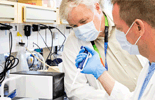Diagnostics
Lab platform can screen thousands of COVID samples
March 17, 2021
 TORONTO – A robotics platform designed by Sinai Health researchers to screen thousands of COVID-19 samples at once has the potential to revolutionize how labs track the spread of viruses and other pathogens, according to new findings.
TORONTO – A robotics platform designed by Sinai Health researchers to screen thousands of COVID-19 samples at once has the potential to revolutionize how labs track the spread of viruses and other pathogens, according to new findings.
The study, out Wednesday in Nature Communications, found that the next-generation, ultra-high-throughput sequencing platform, called C19-SPAR-Seq, designed by researchers from the Lunenfeld-Tanenbaum Research Institute (LTRI) at Sinai Health, has a sensitivity rate greater than 95 percent in positive cases during peak onset.
“Identifying positive samples quickly and accurately is critical in beating this pandemic,” said Dr. Jeff Wrana, senior investigator at the LTRI and professor in the Department of Molecular Genetics at the University of Toronto. “With new and potentially dangerous variants now circulating, this is a platform that is scalable, automated and capable of analyzing thousands of COVID-19 patient samples in a single instrument run.”
Wrana and fellow LTRI senior investigator Dr. Laurence Pelletier, in collaboration with University of Toronto professor Dr. Ben Blencowe, credit a strong team of eager trainees who shifted from other areas of research to help develop and validate the platform, allowing for the team to go from concept to published paper in under 12 months.
“The co-operation of the Mount Sinai Hospital clinical diagnostic lab was the other key ingredient to our success,” said Pelletier. “To date the shared microbiology lab, headed by Dr. Tony Mazzulli, has provided access to thousands of samples.”
In late 2020, the team pivoted again to use the robotics platform to screen thousands of positive samples for variants by rapidly sequencing fingerprint regions of the viral genome to look for key mutations.
“It has been an absolute pleasure to work with Dr. Jeff Wrana and his team at the LTRI,” said Dr. Mazzulli, microbiologist-in-chief for Sinai Health and University Health Network (UHN). “His novel SPAR-Seq System is cutting-edge technology and his team’s ability to sequence COVID-19 samples in real time has tremendous potential for impacting our understanding of the epidemiology and spread of novel mutants in the province.”
The platform is also cost-effective. The study notes it only costs about $8 US per test when running thousands of samples at once, as the cost per sample decreases due to economies of scale.
“It’s extremely reliable and readily adaptable,” said Javier Hernandez, a junior researcher in the Wrana lab who co-led the study with Drs. Marie-Ming Aynaud and Seda Barutcu. “The turnaround is approximately 24 hours. It’s very simple as we’ve automated practically every step in the process. For me, it’s been a very exciting thing to see my work make a difference.”
This study was supported by the Toronto COVID-19 Action Initiative (TCAI) Fund from the University of Toronto and a donation from the Krembil Foundation.
